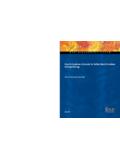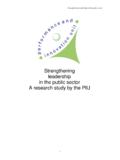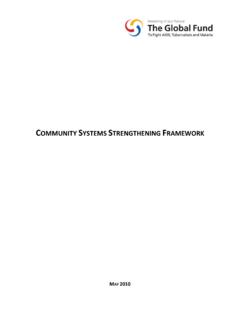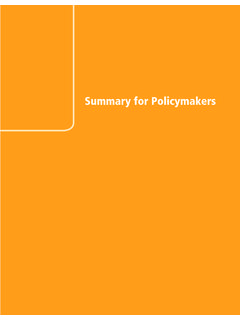Transcription of Primary health care, including health system strengthening
1 SIXTY-SECOND WORLD health ASSEMBLY Agenda item 22 May 2009 Primary health care , including health system strengthening The Sixty-second World health Assembly, Welcoming the efforts of the Director-General, and recognizing the pivotal role that WHO plays, in promoting Primary health care globally; Having considered the report on Primary health care , including health system strengthening ;1 Reaffirming the Declaration of Alma-Ata (1978) and the United Nations Millennium Declaration (2000); Recalling the Ottawa Charter for health Promotion (1986) and subsequent relevant resolutions of WHO regional committees and health Assemblies; 2 Recalling also the discussions at the series of summits and global, regional and national conferences that have reaffirmed the commitment of Member States to Primary health care and strengthening health systems; 3 Noting the growing consensus in the global health community that vertical approaches, such as disease-specific programmes, and integrated health systems approaches are mutually reinforcing and contribute to achieving the health -related Millennium Development Goals; Recognizing the need to draw on the experiences, both positive and negative, of Primary health care in the years since the Declaration of Alma-Ata and the Millennium Declaration.
2 1 Document A62/8. 2 Resolutions , , , , , , , , and 3 including summits on health system strengthening , such as the G8 Hokkaido Toyako Summit (2008), International Conference on Global Action for health system strengthening (Tokyo, 2008), International Conference dedicated to the 30th Anniversary of the Alma-Ata Declaration of WHO/UNICEF on Primary health care (Almaty, 2008), and G15 Summit (2004); WHO regional meetings on Primary health care , such as those at Buenos Aires (2007), Beijing (2007), Bangkok (2008), Tallinn (2008), Ouagadougou (2008), Jakarta (2008) and Doha (2008); and conferences on health promotion, such as Ottawa (1986), Adelaide (1988), Sundsvall (1991), Jakarta (1997), Mexico City (2000), Bangkok (2005) and the MERCOSUR Task Force on health (since 1995).
3 2 Welcoming The world health report 2008,1 published on the thirtieth anniversary of the international conference of Alma-Ata, that identifies four broad policy directions for reducing health inequalities and improving health for all: tackling health inequalities through universal coverage, putting people at the centre of care , integrating health into broader public policy, and providing inclusive leadership for health ; and also welcoming the final report of the Commission on Social Determinants of health ;2 Reaffirming the need to build sustainable national health systems, strengthen national capacities, and honour fully financing commitments made by national governments and their development partners, as appropriate, in order to better fill the resource gaps in the health sector.
4 Reaffirming also the need to take concrete, effective and timely action, in implementing all agreed commitments on aid effectiveness and to increase the predictability of aid, while respecting recipient countries control and ownership of their health system strengthening , more so given the potential effects on health and health systems of the current international financial and food crises and of climate change; Strongly reaffirming the values and principles of Primary health care , including equity, solidarity, social justice, universal access to services, multisectoral action, decentralization and community participation as the basis for strengthening health systems; 1.
5 URGES Member States: (1) to ensure political commitment at all levels to the values and principles of the Declaration of Alma-Ata, keep the issue of strengthening health systems based on the Primary health care approach high on the international political agenda, and take advantage, as appropriate, of health -related partnerships and initiatives relating to this issue, particularly to support achievement of the health -related Millennium Development Goals; (2) to accelerate action towards universal access to Primary health care by developing comprehensive health services and by developing national equitable, efficient and sustainable financing mechanisms, mindful of the need to ensure social protection and protect health budgets in the context of the current international financial crisis.
6 (3) to put people at the centre of health care by adopting, as appropriate, delivery models focused on the local and district levels that provide comprehensive Primary health care services, including health promotion, disease prevention, curative care and palliative care , that are integrated and coordinated according to needs, while ensuring effective referral system ; (4) to promote active participation by all people, and re-emphasize the empowering of communities, especially women, in the processes of developing and implementing policy and improving health and health care , in order to support the renewal of Primary health care ; (5) to train and retain adequate numbers of health workers, with appropriate skill mix, including Primary health care nurses, midwives, allied health professionals and family 1 The world health report 2008: Primary health care now more than ever.
7 Geneva, World Heath Organization, 2008. 2 Commission on Social Determinants of health . Closing the gap in a generation: health equity through action on the social determinants of health . Geneva, World health Organization, 2008. 3 physicians, able to work in a multidisciplinary context, in cooperation with non-professional community health workers in order to respond effectively to people s health needs; (6) to encourage that vertical programmes, including disease-specific programmes, are developed, integrated and implemented in the context of integrated Primary health care .
8 (7) to improve access to appropriate medicines, health products and technologies, all of which are required to support Primary health care ; (8) to develop and strengthen health information and surveillance systems, relating to Primary health care in order to facilitate evidence-based policies and programmes and their evaluation; (9) to strengthen health ministries, enabling them to provide inclusive, transparent and accountable leadership of the health sector and to facilitate multisectoral action as part of Primary health care ; 2. REQUESTS the Director-General: (1) to ensure that WHO reflects the values and principles of the Declaration of Alma-Ata in its work and that the overall organizational efforts across all levels contribute to the renewal and strengthening of Primary health care , in accordance with the findings of the Commission on Social Determinants of health ; (2) to strengthen the Secretariat s capacities, including capacities of regional and country offices, to support Member States in their efforts to deliver on the four broad policy directions for renewal and strengthening of Primary health care identified in The world health report 2008.
9 (3) to collate and analyse past and current experiences of Member States in implementing Primary health care and facilitate the exchange of experience, evidence and information on good practice in achieving universal coverage, access and strengthening health systems; (4) to foster alignment and coordination of global interventions for health system strengthening , basing them on the Primary health care approach, in collaboration with Member States, relevant international organizations, international health initiatives, and other stakeholders in order to increase synergies between international and national priorities; (5) to ensure adequate funding for health system strengthening and revitalizing Primary health care in the Programme budget 2010 2011; (6) to prepare implementation plans for the four broad policy directions: (1) dealing with inequalities by moving towards universal coverage; (2) putting people at the centre of service delivery; (3) multisectoral action and health in all policies; (4) inclusive leadership and effective governors for health .
10 To ensure that these plans span the work of the entire Organization, and to report on these plans through the Executive Board to the Sixty-third World health Assembly and subsequently on progress every two years thereafter. Eighth plenary meeting, 22 May 2009 A62/VR/8 = = =

















